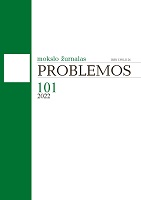An Arendtian Reading of Antigone: Tyrrany Emerging from Righteousness
An Arendtian Reading of Antigone: Tyrrany Emerging from Righteousness
Author(s): Efe BaştürkSubject(s): Ethics / Practical Philosophy, Aesthetics, Political Philosophy, Sociology of Culture, Theory of Literature
Published by: Vilniaus Universiteto Leidykla
Keywords: Antigone; Creon; Tyranny; Hamartia; Phronesis;
Summary/Abstract: The aim of this article is to investigate the tyrannical similarity between Antigone and Creon through Hannah Arendt’s political philosophy. As Arendt claimed, tyranny firstly signals the end of the political through which men can share their natality. The very meaning of tyranny is the domination by absoluteness that ends deliberation among mortal beings. Antigone only focuses on the divine law, which is seen as absolute righteousness that precedes the law of the city, and so, she tends to ignore any other option on rightfulness. This article aims to show that not only Creon but also Antigone can be regarded as a tyrant, since Antigone tends to sublime her dedication to an infallible justice, causing her to deny any other claim on justice.
Journal: Problemos
- Issue Year: 2022
- Issue No: 101
- Page Range: 66-78
- Page Count: 14
- Language: English

